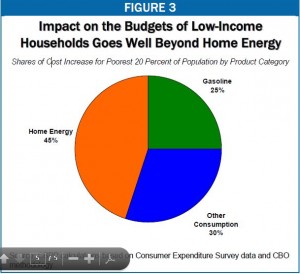Poor families (bottom 20% of household income) spend well over 10% of their annual budgets on energy and related items. And as the figure below indicates (from the Center for Budget and Policy Priorities) the impact of higher fuel costs on the poor goes well beyond the direct increases in electricity and gasoline charges.
The research (and meta-research) of James Hamilton has also demonstrated that oil price shocks can have a significant (and large) negative impact on domestic growth prospects. And we know that wholly aside from the direct impact of higher energy costs on the well-being of the poor, it tends to be the least economically advantaged that are most hurt by downturns in economic activity. Just look at the unemployment rates by education-level during this recession for a glimpse of what I mean.
Let’s keep this short then. Energy price shocks disproportionately hurt the poor in two ways: directly through their pocketbooks and indirectly through the suppression of economic growth. It would seem to me then that as a matter of social justice we would be feverishly pursuing any and all energy policies that would prevent these trends from happening, and this includes accounting for whatever adverse environmental impacts might occur from this pursuit (I suppose this observation depends on exactly who the object of social justice might be). This observation is of course wholly divorced from the possibility that development of fracking and related industries is likely to provide employment for hundreds of thousands of people, many of whom you would think would be the target of “social justice policy” in the first place. But these jobs are costs not benefits. We should want to burn cheap energy and not have to work to do it. Irrespective of what one’s views are on the validity of “social justice” as a doctrine for guiding us in our political affairs, it should at least be in the realm of decent matters to require a consistent approach to the doctrine if it is going to be invoked.

[…] Fracking and Social Justice Share this:ShareEmailPrintRedditFacebookDiggTags: Misc. /* […]
Yes, Wintercow. How can anybody openly advocate higher prices for anything, including home heating? To do what? Make us France, where the hot water in the pension costs extra?
Every day the case for fracking gets stronger. Yes, everybody is concerned about hazards, including the companies that spend millions to discover, drill, produce, and deliver the gas, and clean up after. But should the government actively impede fossil fuel production to drive up the price of everything so electric cars can flourish? They do explode, you know. Even if you could light your water faucet like a Bunsen burner, is that any more scary?
I’ve never understood why the left advocates policies that clearly damage the welfare of the poor.
I’m paying over $9.00 per gallon for gasoline here in Mauritius. Per capita GDP here is about $15,000. Rich for an African nation, but still poor. A reduction in energy prices due to increased supply would benefit the poor around the world.
Increasing the supplies of oil and gas is nothing but good.
If I had natural gas coming out of my water faucet, I’d call Exxon, not the DEP and EPA.
Very many people are vulnerable to superstition when it comes to oil and gas drilling. Superstition finds a way around facts and finds a way to be fearful of anything new, like extracting natural gas from shale a mile or more deeper than the nearest aquifer.
Oil companies know that they face civil liabilities whenever they drill, and if any property owner finds natural gas coming from the faucet or if the Pennsylvania Fish Commission detects a spill of mud and detergents into a stream, the drilling company will pay dearly. That’s why there are so few claims of damage — the last thing Shell or Exxon officials want is to wind up in court.
I really don’t care about poor people. Poor people never come by my house offering to mow the lawn or wash the dishes. That’s because in reality there are no poor people. People described as poor have plenty of food, housing, cell phones, cable TV, tattoos, cigarettes, drugs, legal representation, medical care, and an army of wealthy advocates that trade other people’s money for the electoral affections of the faux poor. The fact is, we need poor people, we need people willing to work for small wages or even room and board, people who are willing to be maids and butlers and footmen and waiters and such. What’s the point in being rich if you can’t afford servants?